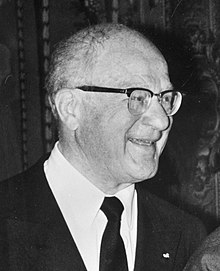An Evaluative English essay
I was fortunate enough to receive my English Language GCSE Paper 2 back and with marks back. As it happened, my mock newspaper article was rather well received and I scored in the highest band of marks. So I'm going to repost it here, unedited, to share to the wider world. This was written on a cold Friday morning in my school's sports hall and it took me 45 mins. It's therefore far from perfect but I'm happy with it nonetheless. Enjoy...
My exam question was as follows:
 Avery Brundage was a keen advocate of amateurism, the belief that sport should be a hobby and not corrupted by commercialisation. Yet he was also president of the International Olympic Committee in the post-war world for over 20 years.
Avery Brundage was a keen advocate of amateurism, the belief that sport should be a hobby and not corrupted by commercialisation. Yet he was also president of the International Olympic Committee in the post-war world for over 20 years.
My exam question was as follows:
'All Sport should be fun, fair and open to everyone. These days, sport seems to be more about money, corruption and winning at any cost'
Write a newspaper article explaining your point of view on this statement.
 Avery Brundage was a keen advocate of amateurism, the belief that sport should be a hobby and not corrupted by commercialisation. Yet he was also president of the International Olympic Committee in the post-war world for over 20 years.
Avery Brundage was a keen advocate of amateurism, the belief that sport should be a hobby and not corrupted by commercialisation. Yet he was also president of the International Olympic Committee in the post-war world for over 20 years.
Brundage was a principled man. It's a pity his principles didn't evolve.
For in his later years, professionalism began infiltrating his beloved major Olympiad in Mexico and Munich. The result of this professionalism: an improved sporting standard and a captivated audience. the downside though was commercialisation of many sports; marginalisation of others and the financially driven attitude of athletes to the point where all but around 5 of nation's National Olympic Committees offer monetary incentives for their places on podiums. Britain - I at least am proud to say - isn't one of them.
The reality is that, as is often the case in many societies, you need the best of both worlds. Football, Baseball and Tennis all attract large crowds yet athletes are not driven by the desire to impress their fans or the inner feeling of satisfaction and pride. Rather, they're driven by wage packets, bonuses and image rights. Bernard Tomic recently admitted to feeling 'bored' whilst playing at Wimbledon, feeling no longer motivated by his own performances or the occasion of a Grand Slam.
So what is the result of this commercialised mayhem?
Smaller, less money-driven sports are squeezed away from their utopia of a 'magic money tree' and infrastructure. Instead sports such as Badminton are being forced to beg on the Internet for funding, despite reaching previously agreed medal targets. It means that Badminton may be unable to fund a team for the Olympics, while 23 young men can venture to the hypothetical corners of the Earth, kicking leather into onion bags to boost their transfer value and reputation whilst lower league clubs will struggle to survive through a summer of no income.
Clarification is important so I will be clear:
Professionalism has globalised major sporting events and brought in new audiences from all populated continents. Yet amidst such a commercialised environment, desperately attempting to avert corruption allegations, the 'winner-takes-all' attitude has taken control.
I therefore believe that to look forward to a more open, diverse sporting landscape - we need to look back to a relaxed, simpler time. a time when sport was a hobby, a leisure activity intended to divert attention from the stresses of the working environment.
Afterall, we owe it to these leisure activities that our society can watch and understand these major sporting events as they take place under our noses.
And as for Avery Brundage, he died in Switzerland in 1975, married to a German princess and oblivious to the rise of the commercialised monster of sport he'd been fending off for 40 years in administration.
Ignorance is bliss.
FACT of the IPOT: This essay was aided by my browsing on Wikipedia in the week prior to this exam when I should've been revising properly. at least this time, my excuse was vindicated!
Comments
Post a Comment